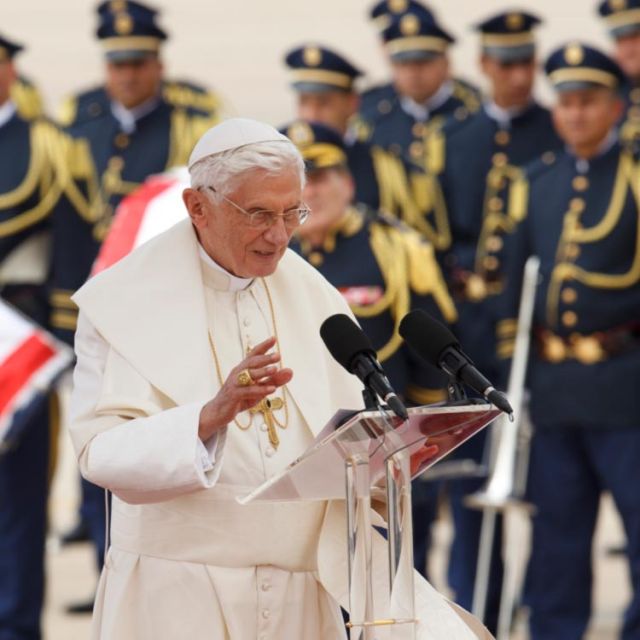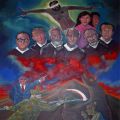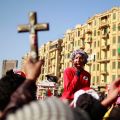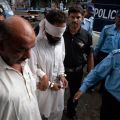News/International
BEIRUT - Pope Benedict XVI arrived in Lebanon Sept. 14, saying that he came "as a pilgrim of peace, as a friend of God and as a friend of men."
In his remarks at a welcoming ceremony at Beirut's airport, Pope Benedict praised Lebanon, with a mixed population of Christians and Muslims, for its distinctive record of "co-existence and respectful dialogue."
But speaking in a country that was devastated by a civil war from 1975 to 1990, the Pope acknowledged that Lebanese society's "equilibrium, which is presented everywhere as an example, is extremely delicate."
"Sometimes it seems about to snap like a bow which is overstretched or submitted to pressures," he said.
The Pope urged Lebanese to do everything possible to maintain this social equilibrium, which he said "should be sought with insistence, preserved at all costs and consolidated with determination."
Earlier in the day, speaking to reporters on the plane from Rome, Pope Benedict addressed some of the turbulence currently afflicting the rest of the Middle East. He praised the so-called Arab Spring, a revolutionary wave that started in December 2010, leading to the fall of dictatorships in Tunisia, Egypt, Libya and Yemen, and currently threatening the government of Syria, just across the border from Lebanon.
The Pope said the movement represented positive aspirations for democracy and liberty and hence a "renewed Arab identity." But he warned against the danger of forgetting that "human liberty is always a shared reality," and consequently failing to protect the rights of Christian minorities in Muslim countries.
Many Middle Eastern Christians fear that revolution has empowered Islamist extremism in the region, increasing the danger of attacks and persecution of the sort that Iraq's Christians have suffered since the fall of Iraqi leader Saddam Hussein.
Asked about the current exodus of Christians from civil-war-torn Syria, the Pope noted that Muslims, too, have been fleeing the violence there. He went on to say that the best way to preserve the Christian presence in Syria was to promote peace, among other ways by restricting sales of military arms.
Speaking only three days after the killing of the U.S. ambassador to Libya and three of his staff members, the Pope told reporters that he had never considered cancelling his visit to Lebanon out of security concerns, and that no one had advised him to do so.
Sr. Mary Rose McGeady led Covenant House out of its darkest days
By Catholic News ServiceALBANY, N.Y. - Sr. Mary Rose McGeady, who took over Covenant House for homeless youth after its founder was accused of financial and sexual improprieties, died of respiratory failure in Albany Sept. 13. She was 84.
Arrangements for her funeral Mass in Albany and a memorial service in New York City were incomplete.
A member of the Daughters of Charity of St. Vincent de Paul, Sr. McGeady served as president of Covenant House from 1990 until her retirement in 2003, doubling the number of homeless young people served by the international network annually.
Covenant House was at its lowest point when she took over because of accusations against its founder, Franciscan Father Bruce Ritter, who later left the Franciscan order and died in 1999.
"Fr. Ritter had done a wonderful job of creating Covenant House, and then he was disgraced," she said in a 2004 interview with The Evangelist, Albany diocesan newspaper. "But the place was still there. (The work) he had started still needed to be done. I looked upon myself as a healer. I said, 'God, if you want this place to go on, you do it.' ”
Then-New York Gov. Mario Cuomo said when she was appointed, "We confidently predict that not many years from now, we will all look back at the moment of Covenant House's greatest pain and see that it was also a moment of birth of a new, stronger, even more effective instrument of goodness. I believe this will happen because of their superb new leader, Sr. Mary Rose McGeady."
Kevin Ryan, the current head of Covenant House, who was among those present at her bedside when she died, called Sr. McGeady "the Mother Teresa of street children" and "a holy tornado of determination and compassion."
"She had a huge soft spot for kids, but she was no one's fool," Ryan said. "Come hell or high water, she was determined to clean up Covenant House. From ashes, really, she pulled Covenant House forward and saved hundreds of thousands of kids."
During her tenure, Covenant House expanded its reach dramatically, with new crisis shelters, street outreach and long-term residential programs for homeless youth in Canada — it operates in Toronto and Vancouver — the United States and Nicaragua. Covenant House now reaches more than 57,000 children and youth in six countries each year.
Born June 28, 1928, in Hazelton, Pa., Sr. McGeady worked with children for more than 40 years before joining Covenant House.
Among the posts she held were executive director of the Nazareth Child Care Centre for Homeless Children in Boston, executive director of the Astor Home for Children in Rhinebeck, N.Y., and associate director of Catholic Charities for the diocese of Brooklyn.
She said in the 2004 interview that transitions were never easy for her.
"I would get word that I was transferred, and I cried my eyes out," she said. "I thought this was terrible. And yet, every time I was transferred, I would move into a new position where I learned more about what I was supposed to do and be."
Sr. McGeady said one of the "great blessings God has given me on this Earth" was watching children "survive, prosper and grow."
"There is no greater joy than to see a kid come in homeless, cold, hungry, dirty and then that same kid a few weeks later — cleaned up, smiling and hopeful," she said. "I believe that is what Covenant House is all about ... one child and one miracle at a time."
Ryan said Sr. McGeady "lived and died every day with the successes and failures of our kids ... and she saw God in the tired faces of the kids who walked through the open doors of Covenant House."
She is survived by her sister Catherine Pendleton and eight nephews.
Salvadoran tied to Jesuit slayings pleads guilty to U.S. immigration charges
By Edgardo Ayala, Catholic News ServiceSAN SAVADOR - News that a former Salvadoran army official accused in the 1989 slayings of six Jesuits priests pleaded guilty to charges that he lied to U.S. immigration officials and now faces deportation to Spain to face prosecution in the deaths was welcomed by the former rector of the university where the clergymen taught.
Inocente Orlando Montano, a retired army colonel who has lived near Boston since 2001, pleaded guilty in federal court to three counts of immigration fraud and three counts of perjury under a deal with federal prosecutors Sept. 11. Montano was among 20 Salvadorans indicted in Spain in 2011 in connection with the killings of the priests, their housekeeper and her daughter. He has denied any involvement in the deaths.
Fr. Jose Maria Tojeira, former rector at the University of Central America in San Salvador, where the priests taught and lived, said the news of the possible deportation and likely prosecution was long overdue.
"Everything that promotes justice is good. However, our maximum interest is to promote justice in El Salvador, so that the country cannot be seen as a place where impunity prevails," Tojeira told Catholic News Service.
"We will continue to seek justice here."
The murders took place in a small compound on the university's campus during one of the fiercest military offensives in the country's 12-year civil war, which ended in 1992.
The retired colonel admitted lying to U.S. officials by saying he was never part of the Salvadoran army and that he never used weapons against other people so that he could be granted temporary protection status. Under such status, Montano could have eventually returned safely to El Salvador.
But records showed that Montano was vice minister of defense for public security at the time of the murders and belonged to a group of military officers known as La Tandona, who controlled the army during the civil war that left an estimated 70,000 dead. The war ended with the Peace Accords in 1992. That group of officers has been linked to serious war crimes committed during the conflict, according to several reports, including findings by the United Nations Truth Commission in 1993.
By pleading guilty to the U.S. charges, Montano, 70, faces a sentence of up to 45 years in prison. A sentencing hearing was set for Dec. 18.
But the retired officer can be deported to Spain, because he is one of 20 Salvadoran officers accused in 2011 by a Spanish court of participating in the murders.
A Spanish judge sent a request to the U.S. government for Montano to be extradited to Spain. A U.S. response is pending.
Religion’s role in Arab Spring is promoting dignity, official says
By Cindy Wooden, Catholic News ServiceVATICAN CITY - Religious communities can assist the North African and Middle Eastern pro-democracy movements by upholding human dignity and not trying to claim power for one religion or one movement within a religion, a senior Vatican official said.
Comboni Father Miguel Angel Ayuso Guixot, secretary of the Pontifical Council for Interreligious Dialogue, represented the Vatican at a conference in Istanbul Sept. 7-8 on “The Arab Awakening and Peace in the New Middle East: Muslim and Christian Perspectives.” He told participants at the conference that democracy presumes respect for human rights, including the right to freedom of religion and worship.
“In the growing efforts to enable democracy to take hold in the fabric of society in the Arab world, the hope is that it will lead to greater consideration of these basic rights,” Ayuso said.
A hopeful sign, he said, was the publication in January of a “bill of rights of basic liberties” by Muslim scholars at Al-Azhar University in Cairo. The document encouraged recognition of the freedoms of worship, opinion, scientific research and art and creative expression in new constitutions throughout the Arab world.
The 2011 Arab Spring movements led to democratic elections in Morocco, Tunisia and Egypt where Islam-inspired political parties won the most votes. The risk with democracy, Ayuso said, is that it “potentially could be used to legitimate extremist and fundamentalist ideologies,” which would make life difficult not only for the Christian minorities, but also for moderate Muslims.
The role of religion, he said, is to nourish an atmosphere of respect for all men and women created by God and endowed with equal dignity, rights and responsibilities.
Ayuso also spoke about the ongoing violence in Syria in his interview with Vatican Radio and at the conference. The Vatican’s diplomatic efforts in that case are focused on achieving a ceasefire, promoting a negotiated settlement, preserving Syria’s multiethnic and multireligious character and getting the Syrian government to recognize the international community’s legitimate interest in the conflict as a potential source of instability to the entire region, he told Vatican Radio.
He told the conference that Syrian Christians want to live in peace and harmony with their fellow citizens, but they are “naturally fearful that the growing violence, destruction and displacement, the continuing loss of life, endangers not just Christians, but all Syrians, regardless of their ethnicity or religion.”
“The specter of what happened to Christians in Iraq” once Saddam Hussein’s regime fell increases Syrian Christians’ fears, he said.
Vatican laments U.S. deaths in Libya, disrespect against religions
By Carol Glatz, Catholic News ServiceVATICAN CITY - In the wake of the deaths of a U.S. ambassador and three staff members in Libya and the unrest triggered by a U.S.-made amateur film hostile to Islam, the Vatican decried disrespect toward all religions and deplored all violence as unacceptable.
"Profound respect for the beliefs, texts, outstanding figures and symbols of the various religions are an essential precondition for the peaceful co-existence of peoples," said Jesuit Father Federico Lombardi, the Vatican spokesman.
"The serious consequences of unjustified offense and provocations against the sensibilities of Muslim believers are once again evident in these days, as we see the reactions they arouse, sometimes with tragic results, which in turn nourish tension and hatred, unleashing unacceptable violence," he said Sept. 12 in a written statement that was also translated into Arabic.
He told journalists that Pope Benedict XVI's Sept 14-16 trip to Lebanon would continue despite the fresh wave of unrest in the region because the Pope's journey is a testament of "peace, understanding and dialogue that's completely opposed to this kind of tension that has been and is being created," he told reporters.
"The message of dialogue and respect for all believers of different religions, which the Holy Father is preparing to carry with him on his forthcoming trip to Lebanon, indicates the path that everyone should follow in order to construct shared and peaceful co-existence of religions and peoples," the spokesman wrote.
The Vatican statement comes after the U.S. ambassador to Libya, J. Christopher Stevens, and three staff members were killed during a mob attack against the U.S. consulate in Benghazi Sept. 11. The violence was triggered by angry reaction to the trailer of a film mocking the prophet Mohammed. Though the trailer was released online in July, it was recently dubbed into Arabic and grabbed Arab media attention.
Tensions spread the same day as thousands of unarmed demonstrators gathered outside the United States Embassy in Cairo and some later breached the compound's walls and destroyed a flag found inside.
Libya's interim president, Mohammed Magarief, offered his condolences and apologized for the attack, describing it as "cowardly," according to the Associated Press.
U.S. President Barack Obama condemned the killings and praised Stevens' selfless service to the United States and the Libyan people.
"While the United States rejects efforts to denigrate the religious beliefs of others, we must all unequivocally oppose the kind of senseless violence that took the lives of these public servants," Obama said in a statement.
Meanwhile, the Vatican's representative in Libya lamented the violence while pleading for greater respect for religious beliefs. Referring to the officials' deaths, Italian Bishop Giovanni Martinelli, Apostolic Vicar of Tripoli, told the Vatican's missionary news agency Fides, "What has happened is terrible, but we need to avoid offending the people's religious sensibility."
"One has to respect the sensitivity of the Muslim population. The Arab countries are already in the throes of momentous upheaval; pouring gasoline on religious outrage is really dangerous," he said in a Sept. 12 interview.
Vatican hires finance crime expert
By Carol Glatz, Catholic News ServiceVATICAN CITY - In an effort to comply more fully with international standards against financial criminal activity, the Vatican has hired an outside expert in combating money laundering and financing terrorism.
Rene Brulhart, a 40-year-old Swiss international lawyer, started working as a consultant to the Vatican in September on “all matters related to anti-money laundering and financing of terrorism,” Vatican Radio reported Sept. 11. Brulhart’s “role is to assist the Holy See in strengthening its framework to fight financial crimes,” the broadcast reported.
Jesuit Father Federico Lombardi, the Vatican spokesman, said in a written statement that the hire is “a powerful sign of (the Vatican’s) commitment to work in this direction.”
A report by European finance experts released in July said the Vatican had passed its first major test in becoming more financially transparent and compliant with international norms.
But the report by Moneyval — the Council of Europe’s Committee of Experts on the Evaluation of Anti-Money Laundering Measures and the Financing of Terrorism — said there were still critical loopholes that needed tightening and other “important issues” to be addressed. For example, the committee found the Vatican’s own financial oversight agency, the Financial Information Authority, lacked adequate legal powers and the independence necessary to monitor, inspect and sanction all Vatican agencies and foundations based in Vatican City State that have financial dealings or commercial transactions.
Finding a well-respected, experienced professional was critical because Moneyval’s recommendations “are highly technical elements that require someone with highly technical knowledge,” said a source familiar with the situation.
Lombardi characterized Brulhart’s appointment as part of the Vatican’s “renewed efforts to respond to the (Moneyval) report’s recommendations and ever more efficaciously pursue transparency and financial trustworthiness.”
Brulhart is vice-chair of the global Egmont Group network, which brings together national Financial Intelligence Units that collect and analyse information on suspicious or unusual financial activity, which may then be passed on to law enforcement officials.
He is also head of the Liechtenstein delegation to Moneyval and the coordinator of the Liechtenstein Task Force on Countering the Financing of Terrorism.
CCCB cited for release of Pakistani girl charged with blasphemy
By Deborah Gyapong, Canadian Catholic NewsOTTAWA- A letter from the Canadian Conference of Catholic Bishops to Pakistan's High Commissioner is among many interventions being cited for the release from prison of a Pakistani Christian girl accused of blasphemy.
International Christian Voice (ICV) chairman Peter Bhatti credits the bishops' letter, among other signs of international support, for the release of Rimsha Masih on bail Sept. 7. The 11-year-old girl with Down syndrome was imprisoned Aug. 16 after being accused of burning a Quran. Since her arrest, a Muslim cleric was detained Sept. 2 on suspicion of fabricating evidence against Masih.
"She just came out from bail," said Bhatti, the brother of Shahbaz Bhatti, the assassinated former Minorities Minister and first Christian in the Pakistan government's cabinet. "Her case is not finished yet, and we're not sure how long it will go."
In the meantime, she and her family continue to need protection from extremists who have threatened to burn the family alive and also threatened her 1,500-member Christian community, most of whom have gone into hiding, he said.
"I would like to thank the Canadian Catholic bishops' conference for intervening in this issue," Bhatti said.
The CCCB's human rights committee chairman sent a letter Aug. 31 to the High Commissioner of Pakistan expressing concern for Masih.
"This serious situation has prompted the President of Pakistan, His Excellency Mr. Asif Ali Zardari, to call for an investigation," wrote Bishop Francois Lapierre to High Commissioner Mian Gul Akbar Zeb. "We welcome this gesture, given the circumstances not only of the girl herself but also of Pakistan's religious minorities, including Christians, who are regularly the target of fundamentalist groups, in particular regarding anti-blasphemy laws.
"This year marks the 20th anniversary of the adoption by all States in 1992 of the United Nations Declaration on the Rights of Persons from National or Ethnic, Religious and Linguistic Minorities," Lapierre wrote on behalf of the human rights committee. "In view of this declaration and the initiative of the president of Pakistan, we ask your government to take the necessary measures to find a solution that ensures this girl's freedom, peace and security."
A copy of the letter was sent to Foreign Affairs Minister John Baird who has also publicly expressed concern for the girl's plight as well as those of others targeted through the blasphemy laws.
Bhatti said he was thankful for the interventions not only of the bishops and Baird, but also Immigration Minister Jason Kenney and many other Members of Parliament who have continued to put pressure on Pakistan to repeal its draconian blasphemy laws.
Shahbaz Bhatti was assassinated in 2011 for his opposition to the blasphemy laws and now his brother Paul Bhatti, an eye surgeon, has been serving as National Harmony Minister in Pakistan's government as well as chairman of the All Pakistan Minorities Alliance, which put up the bail for Masih.
ICV is holding a fundraiser in Toronto Sept. 14 to raise money for Masih, her family and members of their community. For information e-mail info@internationalchristianvoice.com.
Former U.S. Rep. Bart Stupak who brokered U.S. health law compromise calls HHS mandate illegal
By Stephen Guilfoyle, Catholic News ServiceCHARLOTTE, N.C. - The Department of Health and Human Services' mandate that would force many religious institutions to provide free contraceptives against their consciences is illegal, former U.S. Rep. Bart Stupak said Sept. 4 during a meeting of pro-life Democrats.
During debate over the legislation that would become the 2010 Patient Protection and Affordable Care Act, Stupak negotiated an executive order with the Obama administration that guaranteed the act would not violate the Hyde Amendment, which forbids federal funding for any abortion or abortion-related care. The HHS mandate violates that executive order, as well as the Hyde Amendment itself, Stupak believes.
"Specifically, as written, it violates the law and violates the executive order," said Stupak, who decided not to seek re-election after passage of the health reform law.
Last year, as her agency set forth the nuts and bolts of the Affordable Care Act, HHS Secretary Kathleen Sebelius declared that nearly all employers must include free contraception and sterilization services in their health insurance policies.
HHS drafted a narrow exemption for religious employers who object to providing contraception, sterilization and abortion-inducing drugs as mandated, but to be exempted they must serve and hire people primarily of their own faith. Catholic schools, hospitals and charitable organizations would not qualify under that standard; they would either have to provide such coverage in violation of Catholic teaching, pay steep annual fines in order to keep providing health insurance to their employees and students, or stop providing health insurance entirely.
Stupak said he was "bewildered" and "perplexed" by the HHS mandate when it was announced last summer. Religious organizations led by the U.S. Conference of Catholic Bishops bristled, and under the vocal leadership of Cardinal Timothy Dolan of New York, conference president, they fought back. They denounced the move at first, asking the Obama administration to back off the HHS mandate. Belmont Abbey College in North Carolina was one of the first to file a federal lawsuit challenging the constitutionality of the HHS mandate. More than 20 similar lawsuits are now in the works.
In response to the criticism, President Barack Obama announced a compromise, giving Catholic institutions a year's reprieve from having to comply with the HHS mandate and allowing them to pass the coverage costs onto their insurance carriers rather than pay for it directly.
But the bishops and other religious institutions argued that the mandate itself was unconstitutional because it violates the First Amendment protection for religious freedom.
The Affordable Care Act was upheld by the U.S. Supreme Court earlier this year, but the court did not review the HHS mandate or other details of the act. One justice even hinted in her written opinion that the HHS mandate, if challenged in federal court, is at risk of being ruled unconstitutional.
Stupak said he agrees with the public outcry over the HHS mandate and its assault on religious organizations' freedom to not offer health insurance coverage for services they consider immoral. He smiled when he was asked about the court battles now getting under way, and he said the Catholic bishops are absolutely right to challenge the HHS mandate. He also noted, without giving specifics, that there have been some moves by the Obama administration to modify the mandate. Dolan and the USCCB staff have asked to meet with administration officials to work out a fix, but those efforts have so far been unsuccessful.
Stupak hinted it is in the Obama administration's best interest to bend on this controversial issue, because the HHS mandate could be overturned in court.
"We don't want this stuck in the courts, being challenged for years," he said.
French carmaker Renault gives Pope electric minivans
By Catholic News ServiceVATICAN CITY - Thanks to a French automaker and an Italian utility, Pope Benedict XVI now has a pair of all-electric minivans and a series of recharging stations with which to power them.
Two custom-made editions of Renault's Kangoo Maxi Z.E. cars were delivered personally to the Pope Sept. 5 at the papal summer villa in Castel Gandolfo.
At a Vatican press conference the next day, representatives of Renault told reporters the two cars were made specifically for the Vatican.
The white version, with the papal stem on the front doors, was designed for the Pope to use, probably at Castel Gandolfo, but Jesuit Father Federico Lombardi, Vatican spokesman, said it also could be used on other occasions when the Pope is in the midst of a crowd.
The roof over the back seats opens and the side windows are removable, so it can be used as a popemobile, the Renault representatives said. It also has a retractable step to make it easier to get in and out of the vehicle.
On a full charge, they said, the Pope's car can cover 160 km. While they did not say how fast the Pope's Kangoo Maxi Z.E. could go, Renault says its unmodified version can reach speeds up to 125 km an hour.
The second Kangoo Maxi Z.E. given to the Pope was designed for the Vatican police force, the "gendarmeria Vaticana." Painted blue, the minivan has police lights on top and a white-and-gold stripe around the sides.
Pope Benedict, the Italian police who patrol St. Peter's Square, and the staff of Castel Gandolfo and the Vatican press office already use electric vehicles, which is why the Italian electric company ENEL has installed recharging stations at the Vatican as well as at the summer villa.
British conference looks at relation between power, abuse in Church
By Cindy Wooden, Catholic News ServiceVATICAN CITY - The "most tragic wound" of clerical sexual abuse will not heal without a response from the entire Catholic Church — hierarchy and laity together — said the chief Vatican investigator of abuse cases.
"I think that slowly, slowly, slowly we are getting toward a response that is truly ecclesial — it's not hierarchical, it's the Church. We are in this together, in suffering (from) the wound and trying to respond to it," Msgr. Charles Scicluna told Vatican Radio.
The monsignor, whose formal title is promoter of justice in the Congregation for the Doctrine of the Faith, spoke to Vatican Radio during a Sept. 4-5 conference in England titled "Redeeming Power: Overcoming Abuse in Church and Society."
The European Society of Catholic Theology sponsored the conference at St. Mary's University College in Twickenham as part of the International Network of Societies for Catholic Theology's three-year research project on "the power of theology to overcome power abuse in Church and society."
Scicluna told Vatican Radio the conference was an important part of the ongoing conversation about how to empower all members of the Church to prevent abuse and promote accountability.
"We are accountable not only to God, but to each other and to our peers in how we respond to difficult questions, including sin and crime," he said.
The monsignor said Pope Benedict XVI is setting an example for the whole Church when he discusses the abuse crisis, repentance and reform of Church norms with bishops, priests and laity.
Marie Keenan, a social worker and psychotherapist who has worked with perpetrators and survivors of clerical sexual abuse, told Vatican Radio that the Church has been slow in responding to the abuse crisis, "but I think that we're moving in the right direction and I think this conference is part of that."
Keenan, who lectures at University College Dublin, said she is concerned that clerical sexual abuse is sometimes seen as "a problem of individuals, either individual perpetrators who were devious and managed to get through the doors" of the seminary undetected, "or bad or erring bishops who didn't have the right heart or spirit or intellect or knowledge or something."
The conference is part of an effort to look at relationships and structures of power within the Church and determine how they may have contributed to the crisis. Keenan said that without addressing those broader issues, the Church risks placing too much trust in the important psychological tests designed to "screen out deviants."
Relying exclusively on the tests is dangerous, she said, because "some of these men chose an abusive road not because they were deviants to begin with, but because something happened to them in the course of their life, either in formation or priesthood or living their life that wasn't picked up on and with which they weren't helped adequately." At the same time, she said, "even with the same formation and the same lifestyle, many, many men don't turn to abuse," so there must be a recognition that Church culture hasn't caused everyone "to use their power position in an abusive way."
In addition, Keenan said that in her research "I found no evidence that celibacy is a cause of sexual abuse." While "there may be good reasons for the Church to rethink the celibacy issue, it's not because of the child sexual abuse issue," she said.
Sister of Charity Nuala Patricia Kenny, a pediatrician and retired professor of bioethics in Canada, said recent cases of abuse and sexual scandal convinced her that "we had not finished the job" of addressing clerical sexual abuse.
"The Church, in the area of policies and protocols, surely now has become a world leader," she said. But as she told the conference, "we have been a slow learner on this one."
Catholics, she said, need to reflect on the question: "How does power and our sense of Church, how has the inactivity of the laity, our inability to have good, positive, loving experiences between priest and people in our Church that would make us a healthy Church — how has all of that made us continue to deny, to fail to accept the difficult challenges" posed by the abuse crisis?
Kenny, who has been a religious for 50 years, said there were days "when I had to kneel, kneel, kneel at my desk and literally hold on to the New Testament because I've been so overwhelmed by how much harm has been done, not just to the individual victims, but to the whole body of Christ."
"I'm not a woman who breaks down easily and cries, but I have wept about this issue," she said. "On the other hand, I can tell you that I know in my heart that the Holy Spirit is leading us somewhere graced and I am perfectly prepared to do whatever I can with the grace and energy the Lord gives me to contribute to that.
"Walking away is not an option because it belongs to my baptismal commitment," Kenny said. "This is my Church."
Muslim cleric arrested in Pakistani girl's blasphemy case
By Catholic News ServiceVATICAN CITY - The case against a Pakistani Christian girl accused of blasphemy seemed to take a turn in her favour after a Muslim cleric was arrested on suspicion of fabricating evidence against her.
Khalid Jadoon Chishti, the imam or prayer leader who has accused Rimsha Masih of burning pages of the Muslim holy book, was taken into police custody Sept. 2. According to a police official quoted by the Associated Press, witnesses claim the imam tore pages from a Quran and planted them along with burned pieces of paper in the girl's bag.
Rimsha has been in police custody since Aug. 18. Her parents said she is 11 years old and has Down syndrome; a court appointed physician found that she was about 14 and is developmentally delayed.
A Pakistan court delayed her bail hearing until Sept. 1, but postponed it again until Sept. 7 after the judge in the case changed.
The girl's lawyer, Tahir Naveed, told Vatican Radio Sept. 3 that with the arrest of the Muslim cleric, "it is no secret that Rimsha is innocent. This shows that there was a conspiracy."
Naveed said Rimsha's case is just the latest instance of someone misusing Pakistan's strict anti-blasphemy laws to intimidate or persecute others.
"After the arrest of Imam Jadoon, everyone is talking and reflecting on the fact that this law can be used improperly and even abused," Naveed said.
Capuchin Father Francis Nadeem, co-ordinator of the National Council for Interreligious Dialogue in Lahore, said the charges against the girl appeared to be part of a plot by a local "land mafia."
"Unscrupulous criminals intend to wrest land from Christians and drive them out from Mehrabadi, a suburb of Islamabad where Rimsha's family lives," Nadeem told the Vatican's missionary news agency Fides. "This is why they made up the case, blaming an innocent child."
Accusations that a Christian had burned the Quran drew an angry crowd, prompting hundreds of Christian families to flee the neighbourhood.











